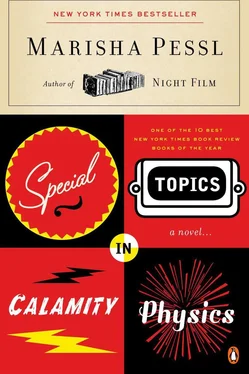Or else, staring at me — and I like to think this was the case — Dad came undone. No book tells one how to look at one’s child one is leaving forever and will never see again (unless it’s clandestinely, after thirty-five, forty years, and only then from a great distance, through binoculars, a telephoto lens or an $89.99 satellite photo). One probably gets close and tries to determine the exact degree of the nose from the face. One counts freckles, the ones never noticed before. And one also counts the faint creases in the eyelids, in the forehead, too. One watches the breathing, the peaceful smile — or, in the absence of such a smile, one willfully ignores the gaping, wheezing mouth, in order to make the memory polite. One probably gets a little carried away, too, introducing a little moonlight to silver the face, covering up those dark circles under the eyes, sound-looping adorable insects — better still, a gorgeous night bird — to lessen the cold, cell silence of the room.
Dad closed his eyes to make sure he knew it by heart (forty-degrees, sixteen, three, one, a sea way of breathing, peaceful smile, silvery eyes, enthusiastic nightingale). He pushed the comforter close to my check, kissed me on the forehead.
“You’ll be fine, sweet. You really will.”
He slipped from my room, downstairs, and outside to the taxi.
“Mr. Ray?” asked the driver.
“ Dr. Ray,” Dad said.
And just like that — he was gone.
The days shuffled by like bland schoolgirls. I didn’t notice their individual faces, only their basic uniform: day and night, day and night.
I had no patience for showers or balanced meals. I did a lot of lying on floors — childish certainly, but when one can lie on floors without anyone seeing one, trust me, one will lie on a floor. I discovered, too, the fleeting yet discernible joy of biting into a Whitman’s chocolate and throwing the remaining half behind the sofa in the library. I could read, read, read until my eyes burned and the words floated like noodles in soup.
I ditched school like a boy with rusty breath and glue-stick palms. Instead, I took up with Don Quixote (Cervantes, 1605) — one would think I’d have driven to Videomecca and rented porn, at the very least Wild Orchid with Mickey Rourke, but alas, no — then some steamy paperback I’d kept hidden from Dad for years called Speak Not, My Love (Esther, 1992).
I thought about Death — not suicide, nothing that histrionic — more a begrudged acknowledgment, as if I’d snubbed Death for years, and now, having no one else, I had no choice but to exchange pleasantries with him. I thought about Evita, Havermeyer, Moats, Dee and Dum forming a nighttime Search Party, wielding torches, lanterns, pitchforks, clubs (as bigoted townspeople did when hunting a monster), discovering my wasted body slung over the kitchen table, arms limp at my sides, my head facedown in the crotch of Chekhov’s The Cherry Orchard (1903).
Even when I tried to collect myself, pull myself together as Molly Brown had done in that Titanic lifeboat, or even find a productive hobby like the Birdman of Alcatraz, I failed. I thought Future. I saw Black Hole. I was spaghettified. I didn’t have a friend, driver’s license or survival instinct to my name. I didn’t even have one of those Savings Accounts set up by a conscientious parent so their kid could learn Money. I was a minor, too, would remain so for another year. (My birthday was June 18.) I had no desire to end up in a Foster Home, the Castle in the Sky of which was to be supervised by a pair of retirees named Bill and Bertha, who wielded their Bibles like handguns, asked me to call them “Mamaw” and “Papaw,” and got tickled pink every time they stuffed me, their brand new turkey, with all the fixins (biscuits, poke salad and possum pie).
Seven days after Dad left, the phone began to ring.
I didn’t answer it, though I remained poised by the answering machine, my heart banging in my chest, in case it was he.
“Gareth, you’re causing quite a stir around here,” said Professor Mike Devlin. “I’m wondering where you are.”
“What on earth have you done with yourself? Now they say you’re not coming back,” said Dr. Elijah Masters, Chairman of the English Department and Harvard Alumni Interviewer. “I’ll be sorely disappointed if that is the case. As you know, we have an unfinished chess game and I’m beating you to a pulp. I’d hate to think you’ve disappeared simply so I have to forgo the pleasure of telling you, ‘Checkmate.’”
“Dr. Van Meer, you must call the office as soon as possible. Again, your daughter Blue has not appeared in class all week now. I hope you’re aware that if she does not begin to make up some of the work, the idea of her graduating on time will be more and more—”
“Dr. Van Meer, this is Jenny Murdoch who sits on the front row of your Patterns of Democracy and Social Structure seminar? I was wondering if Solomon is now going to be in charge of our research papers, because he’s like, to tally giving us new parameters. He says it only has to be seven to ten pages. But you wrote on the syllabus twenty to twenty-five, so everyone’s totally baffled. Some clarification would be much appreciated. I also wrote you an e-mail.”
“Please call me as soon as possible at my home or office, Gareth,” said Dean Kushner.
I’d told Dad’s assistant, Barbara, that I’d written down the incorrect contact number for Dad at the conference and asked her to let me know as soon as she heard from him. She hadn’t called, however, so I called her.
“We still haven’t heard,” she said. “Dean Kushner’s having a heart attack. Solomon Freeman is going to have to take over his classes for finals. Where is he?”
“He had to go to Europe,” I said. “His mother had a heart attack.”
“Ohhh,” said Barbara. “I’m sorry. Is she going to be all right?”
“No.”
“Gosh. That’s so sad. But then why hasn’t he—?”
I hung up.
I wondered if my steady stupor, my inertia, marked the onset of madness. Only a week ago I’d believed madness to be a far-fetched idea, but now I recalled a handful of occasions when Dad and I had encountered a woman muttering expletives as if she were sneezing. I wondered how she’d become that way, if it was a debutante’s dreamy descent down a grand flight of stairs or else a sudden misfire in the brain, its effects immediate, like a snakebite. Her complexion was red like raw dishwasher hands and the soles of her feet were black, as if she’d meticulously dipped them in tar. As Dad and I passed her, I held my breath, squeezed his hand. He’d squeeze back — our tacit agreement he’d never allow me to wander the streets with my hair like a bird’s nest, my overalls marred with urine and dirt.
Now I could, with no trouble at all, wander the streets with hair like a bird’s nest in overalls of urine and dirt. The That’s-Ridiculous, the Don’t-Be-Absurd had happened. I’d be selling my body for a frozen Lender’s bagel. Obviously, I’d been wrong all along about madness. It could happen to anyone.
For those who are Marat/Sade aficionados, I must deliver bad news. The shelf life of a depressed torpor for any otherwise healthy individual is ten, eleven, at the most, twelve days. After that, the mind can’t help but notice such a disposition is as much use as a one-legged man in an arse-kicking contest, and that, if one didn’t stop bouncing around like a big girl’s blouse, Pimms and strawberries, Bob’s your uncle and God save the bloody Queen, one just might not make it (see Go See a Man About a Dog: Beloved Englishisms , Lewis, 2001).
Читать дальше












